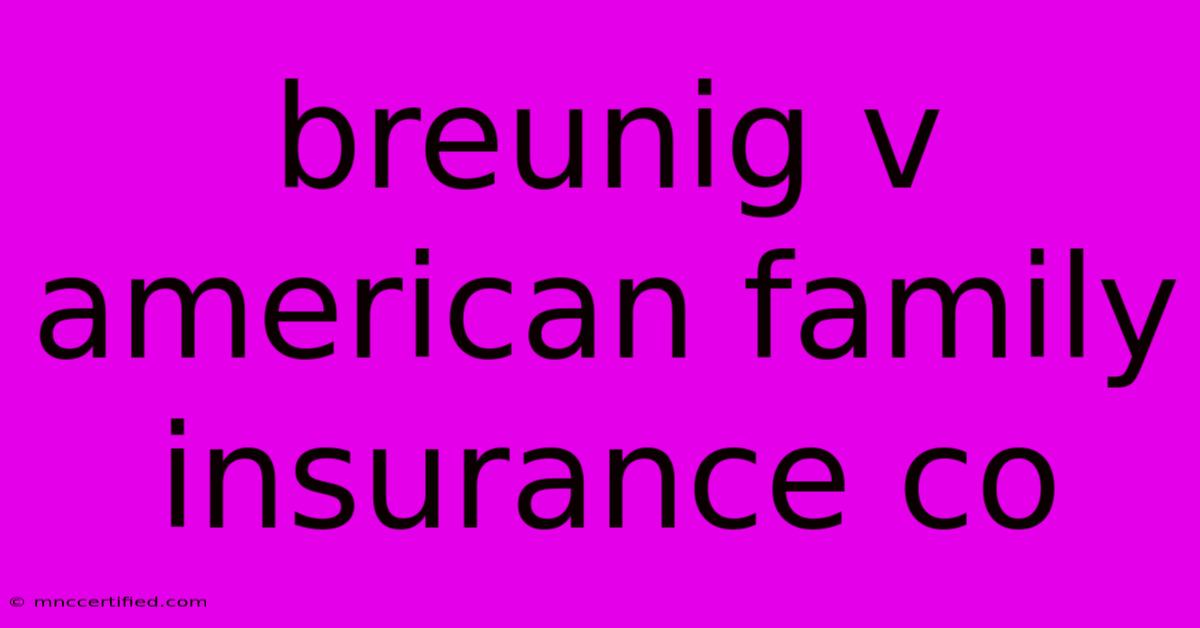Breunig V American Family Insurance Co

Table of Contents
Breunig v. American Family Insurance Co.: A Landmark Case for Coverage Disputes
The case of Breunig v. American Family Insurance Co. stands as a landmark decision in the realm of insurance coverage disputes, particularly in the context of liability coverage and uninsured motorist (UM) coverage. This article delves into the key details of the case, explores its significance, and analyzes its implications for future insurance disputes.
The Case's Background: A Collision and a Coverage Dispute
The Breunig case originated from a car accident that occurred in Wisconsin. Jeffrey Breunig was involved in a collision with another vehicle driven by David Schill. Schill was ultimately found to be at fault for the accident. Breunig, however, was only partially insured under a policy issued by American Family Insurance Company.
The dispute arose when Breunig attempted to claim benefits from American Family for both liability and uninsured motorist (UM) coverage.
The Court's Ruling: Interpreting the Coverage
The Wisconsin Supreme Court, in its 2004 ruling, made a crucial distinction between liability coverage and UM coverage. It held that:
- Liability coverage is intended to protect the insured against claims brought by third parties. This coverage is triggered when the insured is found liable for causing an accident.
- UM coverage, on the other hand, is intended to protect the insured against uninsured or underinsured motorists who are at fault in an accident.
The Court further clarified that UM coverage only applies when the at-fault driver is not adequately insured. Since Schill, the at-fault driver in the Breunig case, had insurance, the Court found that Breunig was not entitled to UM coverage.
Significance and Implications of the Breunig Decision
The Breunig case has far-reaching implications for insurance disputes:
- Clear Distinction Between Coverage Types: The case highlighted the crucial distinction between liability and UM coverage, providing valuable guidance for interpreting these types of policies.
- UM Coverage Limited to Uninsured/Underinsured Drivers: The Court's ruling narrowed the scope of UM coverage, emphasizing its applicability only when the at-fault driver lacks adequate insurance.
- Implications for Policyholders: The decision underscores the importance for policyholders to carefully review their insurance policies to understand the specific coverage they have purchased.
Navigating Insurance Coverage Disputes: Key Takeaways
The Breunig case provides valuable insights for individuals navigating insurance coverage disputes:
- Understanding Policy Language: Thoroughly review your insurance policies to understand the specific coverage you have purchased.
- Consult with an Attorney: Seeking legal advice from an experienced insurance attorney can be invaluable in understanding your rights and navigating the complexities of insurance coverage.
- Document Everything: Keep meticulous records of all communications, claims, and interactions with your insurance company.
Conclusion
The Breunig v. American Family Insurance Co. case remains a landmark decision that has significantly shaped the understanding and interpretation of insurance coverage disputes. Its clear distinction between liability and UM coverage serves as a valuable guide for navigating these complex issues. Understanding the principles established in this case can help individuals protect their rights and ensure they receive the coverage they deserve.

Thank you for visiting our website wich cover about Breunig V American Family Insurance Co. We hope the information provided has been useful to you. Feel free to contact us if you have any questions or need further assistance. See you next time and dont miss to bookmark.
Featured Posts
-
Grammy 2025 Nominations See Whos Up
Nov 09, 2024
-
General Southwest Insurance Phoenix Az
Nov 09, 2024
-
Best Mexican Car Insurance Rocky Point
Nov 09, 2024
-
Lighting Upgrades Start At Van Buren Parking Deck
Nov 09, 2024
-
San Franciscos Next Leader Daniel Lurie
Nov 09, 2024